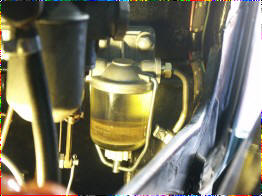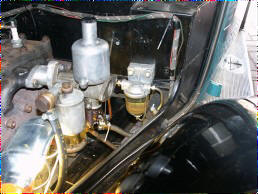
Fitting a Fuel Filter
(with many thanks to the Devon A7C)

There is always a certain amount of muck and water in petrol, a situation made much worse by our 80 year old tanks and fuel lines. However rigorously you wash out the tank and flush the lines a new lot of dirt appears within a few weeks.
Dirt is of course fatal to both carbs and fuel pumps and can build up to an alarming degree, partially blocking jets, causing float chamber needle valves to stick open or closed and generally upsetting the smooth running of the engine. Where engine reliability is more important than cost or space, as for example in sea going boats, fuel filtration is given a high priority in both equipment and service schedules, the multiple filters are large cartridge type and subject to a service change every 100 hours of engine running.
Before modern disposable micro filters were available, boats and agricultural equipment, where there is a greater chance of contamination by dirt or water, used a bowl type fuel filter/water separator. Fortunately for us, and due partly to the popularity of restoring old tractors, such a bowl type filter is still available in a size which is eminently suitable for our cars. It has a filter mesh and a glass bowl which enables the user to see when the filter needs cleaning.
Fitting is simply a matter of finding a suitable position, remembering to keep
the filter below the level of the float chamber, drilling holes for the mounting
bolts and connecting the pipe work. On the Ruby and derived models it may also
be necessary to insert a packing piece between the filter and the bulkhead so
that the bowl is clear of the bulkhead flange.
If anyone doubts the need for a filter the photographs should persuade you, the nearly ½” layer of sludge visible in the glass bowl was accumulated after only two months !!
The filter I used is a `Sparex` Part S40573 which should be available through any agricultural merchants who are agents for Sparex. Its original use was on a Ferguson T20 series, Pre 100 series,& 100 series and Fordson Major tractors.
Howard Palmer, Devon A7C with very many thanks.